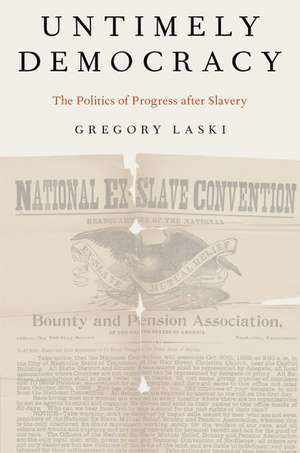Untimely Democracy: The Politics of Progress After Slavery
Autor Gregory Laskien Limba Engleză Paperback – 29 apr 2022
| Toate formatele și edițiile | Preț | Express |
|---|---|---|
| Paperback (1) | 222.85 lei 10-16 zile | |
| Oxford University Press – 29 apr 2022 | 222.85 lei 10-16 zile | |
| Hardback (1) | 529.02 lei 31-37 zile | |
| Oxford University Press – 2 noi 2017 | 529.02 lei 31-37 zile |
Preț: 222.85 lei
Preț vechi: 258.73 lei
-14% Nou
Puncte Express: 334
Preț estimativ în valută:
42.66€ • 46.35$ • 35.85£
42.66€ • 46.35$ • 35.85£
Carte disponibilă
Livrare economică 20-26 martie
Preluare comenzi: 021 569.72.76
Specificații
ISBN-13: 9780197624128
ISBN-10: 019762412X
Pagini: 288
Dimensiuni: 239 x 155 x 17 mm
Greutate: 0.42 kg
Editura: Oxford University Press
Colecția OUP USA
Locul publicării:New York, United States
ISBN-10: 019762412X
Pagini: 288
Dimensiuni: 239 x 155 x 17 mm
Greutate: 0.42 kg
Editura: Oxford University Press
Colecția OUP USA
Locul publicării:New York, United States
Recenzii
...offers a powerful examination of late nineteenth-century American authors, particularly Frederick Douglass, Stephen Crane, Callie House, W. E. B. Du Bois, Charles Chesnutt, Sutton E. Griggs, and Pauline E. Hopkins.
challenge[s] the field's reductive drive to periodize by century, uncovering a long and rich history of writing about democracy
...has much to offer political theorists, in particular those who have found African American works of literature to be rich sources of political thought. There is much to learn from both its archive of often overlooked texts and its method of nuanced close-reading, which focuses as much on narrative form as on the manifest content of the texts it examines. Readers in any discipline will find it a pleasure to read. In every chapter, Laski's clear and energetic prose is studded with brilliantly concise formulations.
what Laski gives us is an intellectually thrilling, exhaustively researched book that should alter how we study the long nineteenth century.
Gregory Laski's Untimely Democracy is an intriguing and thought-provoking assessment of how writers and activists of the post-Reconstruction era grappled with the period's troubling realities.
While the promise of freedom is often coupled to the train of historical progress, Untimely Democracy argues that it is time to derail this conventional assumption. Looking at writers as diverse as Pauline Hopkins and Stephen Crane, Gregory Laski overturns not just settled ideas about chronologies but also the political desire to sever the past from the present. This is a clear and compelling read.
Laski's meticulously researched volume offers critical insight into how slavery shapes American democracy in the past and the present. It also offers essential analysis of postbellum literature.
Laski's complex and sophisticated text will have great appeal to political theorists and political philosophers as well as scholars of American political development and American letters and literature.
Despite its scholarly tone, Untimely Democracy: The Politics of Progress after Slavery resonates with wide audiences interested in the question of progress.
challenge[s] the field's reductive drive to periodize by century, uncovering a long and rich history of writing about democracy
...has much to offer political theorists, in particular those who have found African American works of literature to be rich sources of political thought. There is much to learn from both its archive of often overlooked texts and its method of nuanced close-reading, which focuses as much on narrative form as on the manifest content of the texts it examines. Readers in any discipline will find it a pleasure to read. In every chapter, Laski's clear and energetic prose is studded with brilliantly concise formulations.
what Laski gives us is an intellectually thrilling, exhaustively researched book that should alter how we study the long nineteenth century.
Gregory Laski's Untimely Democracy is an intriguing and thought-provoking assessment of how writers and activists of the post-Reconstruction era grappled with the period's troubling realities.
While the promise of freedom is often coupled to the train of historical progress, Untimely Democracy argues that it is time to derail this conventional assumption. Looking at writers as diverse as Pauline Hopkins and Stephen Crane, Gregory Laski overturns not just settled ideas about chronologies but also the political desire to sever the past from the present. This is a clear and compelling read.
Laski's meticulously researched volume offers critical insight into how slavery shapes American democracy in the past and the present. It also offers essential analysis of postbellum literature.
Laski's complex and sophisticated text will have great appeal to political theorists and political philosophers as well as scholars of American political development and American letters and literature.
Despite its scholarly tone, Untimely Democracy: The Politics of Progress after Slavery resonates with wide audiences interested in the question of progress.
Notă biografică
Gregory Laski is an Assistant Professor of English at the United States Air Force Academy. He is co-founder of the Democratic Dialogue Project, a Mellon grant-funded exchange between Air Force Academy and Colorado College students that seeks to bridge the military-civilian divide.

